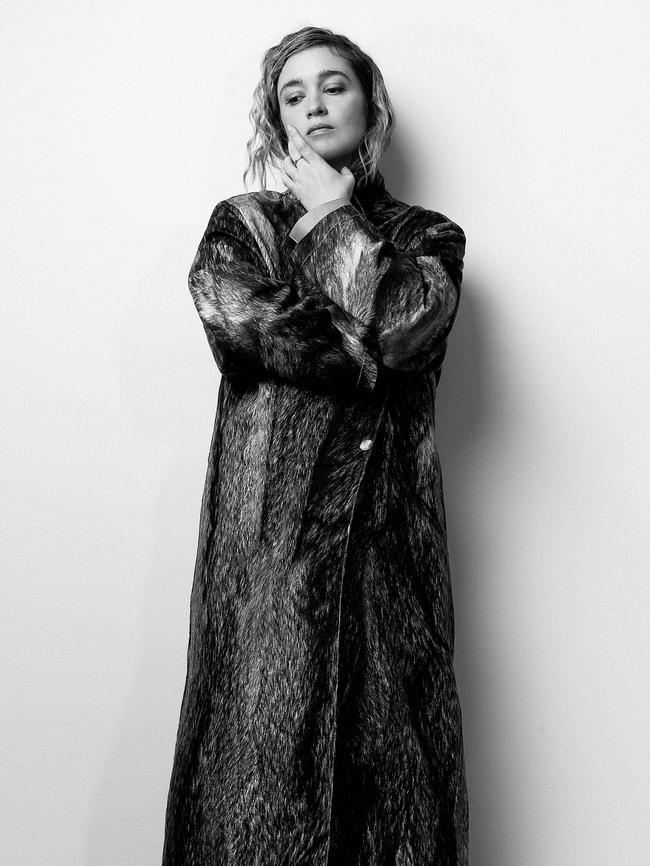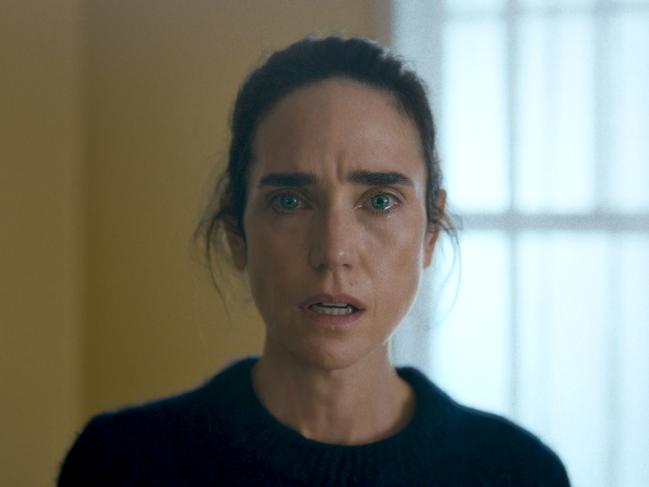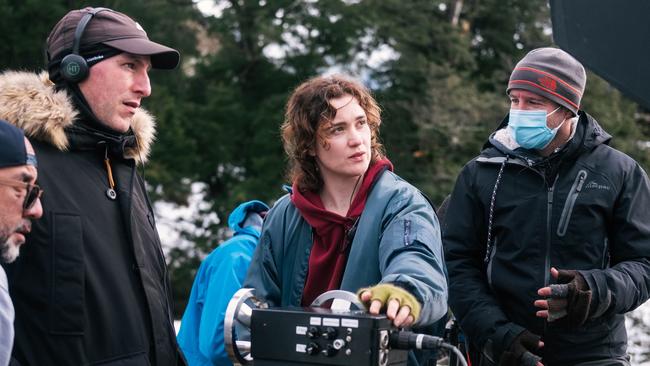Alice Englert on filmmaking and the ‘ridiculousness’ of modern spirituality
For her directorial debut, the actor, writer and now filmmaker Alice Englert excavates the incontrovertible bond between mothers and daughters.

Alice Englert spent a lot of time on film sets as a child. The daughter of the filmmaker Jane Campion, she was raised behind her mother’s camera; as a toddler, Englert copied her mum and shouted “action” on the set of Nicole Kidman’s 1997 period adaptation The Portrait of a Lady, and she spent many afternoons kicking about in the editing suite of the 2003 psycho-sexual drama In The Cut. (She was eight; if the scenes became too adult, Englert was sent to the waiting room.) A few years later, Englert was the one in front of the camera, appearing in Campion’s short film The Water Diary.
Film sets were an endlessly fascinating place for a kid, says Englert. “I just remember being amazed at watching adults know exactly what they were doing. You are watching them being so, so serious and focused about something that is just so ridiculous. It felt like tenderness and toughness all at once,” Englert smiles. “Watching the ‘action’ when everyone goes really quiet, and some strange little thing happens. It was just a really nice human arrangement.”

We’re sitting on a soporific couch in a cafe around the corner from the Sydney studio where Englert has just shot for Vogue Australia. At first, Englert is all comfortable repose, despite admitting she is still “numb” from the recent Australian premiere of her own directorial debut, the Jennifer Connelly-led dark comedy Bad Behaviour. But as the conversation unfolds, Englert sits up, alert and engaged. Especially when talking about things she’s passionate about, which range from reality television – “In [my TV show] Dangerous Liaisons, you have to go to these quite dramatic places, I did use Housewives … If they can be flipping tables and throwing legs, it’s like, ‘Come on Alice. Get on out there,’” – to the strange magic of a film set. Of “trying to say something real through something fake”.
At 29, Englert is an expert on this. As an actor, she has starred in big, blockbuster young adult adaptations (Beautiful Creatures), intimate dramas (Ginger and Rosa alongside Elle Fanning), and television shows including Netflix’s true crime miniseries The Serpent, last year’s Dangerous Liaisons and the second season of Top Of The Lake. As a child, Englert often witnessed adults experience a clarity of purpose while working on movies. Is that how she feels on film sets now? “I kind of do,” she admits. “But I also don’t know what I’m doing, but I know how to figure it out. I know how not to pretend to know what I’m doing.” In New Zealand making Bad Behaviour in 2022, Englert had an epiphany. “I was like, ‘Oh no, I’m going to have to seem like a leader.’ But then I realised that you only have to do the part that you know. Because everyone else is an expert in what they do. You just have to listen.”
Bad Behaviour is a movie that defies definition. The elevator pitch is that Lucy (Connelly), a former child star, goes to a spiritual retreat led by the spurious guru Elon (Ben Whishaw) in the Oregon wilderness and is driven to the brink of … something. Meanwhile, Lucy’s daughter Dylan (Englert, directing herself), a stuntwoman on a nonsensical fantasy movie in the New Zealand wilderness, is listless and adrift. For the first half of the film, Lucy and Dylan are oppositional forces circling each other. In the back half, their stories collide. That’s the marketing copy. But the film is prickly and ever so slightly unhinged, a pass the parcel where each carefully crafted layer reveals some fresh absurdity.
“I love the embarrassment of it. People who have been to these retreats know how funny it all is”
Whishaw is very funny as the kind of person you would follow into motivational quote oblivion. (Englert remembers giving him the “absolutely ridiculous” direction: “Can you please be more enlightened?”) The movie is hilarious – one scene is set during an exercise at the retreat in which Connelly has to pretend to be a swaddled, wailing baby – and it’s also shocking and profound. Neither Lucy nor Dylan are perfect people. “When you are only offered redemption when you are guilt-free and pure, there’s not much hope for the world,” Englert sums up. She wanted to make a movie that highlighted the “normalcy of scar tissue”, a story reminding audiences that nobody gets through life unscathed.
Englert began writing the film when she was 24, based on ideas that appear to have been percolating for years. “Defo,” she agrees. (Englert has a delightfully patchworked way of speaking. She asks if we need to break out the “Googly maps” on our walk from studio to cafe; she enthuses about “a good old sobbacino”, which is Englert speak for crying.)

A devoted meditator, she wanted to explore the inherent ridiculousness of modern spirituality. “I love the embarrassment of it,” Englert explains. “People who have been to these retreats, they actually know how funny it all is.” She was inspired by the Westerns of Sergio Leone; she likens the energy on a retreat to the “rangy”, unpredictable shiftiness of a frontier town. “Everyone’s trying to pan for gold. Someone’s gonna get the nugget, but you don’t know who.”
While writing, she was struck by a vision of a woman, “like a black hole that was sucking everything into this nothingness and that it was almost enlightenment, in a strange way”. Can’t a breakdown also be its own kind of breakthrough?

To be her black hole: none other than Jennifer Connelly. The Oscar-winner arrived fresh from Top Gun: Maverick; Englert wrote her a letter asking her to come on board in which she described her as the “blue part of the flame”. “It looks cold but is the hottest part,” recounts Englert. “I needed those contradictions in her … Lucy for me was someone who is living on this fault line of two tectonic plates. One is privilege and one is oppression. And she doesn’t know what to do with it so she just erupts.” Englert pauses. “I love her and I’m scared of her. Do you know Jennifer?” (I do not.) “I say it like I don’t know her,” she laughs. “She’s still such a mystery to me.”
By some trick of the production schedule, Englert directed Connelly first, in the retreat scenes, before she acted opposite her as her onscreen daughter. “I got to see her in the way that a daughter does see a parent. She was larger than life. I saw every expression she pulled, I saw every nuance.” Bad Behaviour examines those moments as a child when you begin to see the long arc of your parents’ own lives. “Everything that you are trying to understand about them, they have had hardly any time to try and understand about themselves. ’Cos they’re just getting out from under their own experiences,” Englert explains.

Was she trepidatious to write about a mother-daughter relationship, for fear that people would read meta-textual layers about Campion into the film? She shrugs. She’s used to it. “My relationship with her is not very known at all,” Englert begins. “The way that people perceive a famous person is so incredibly different to the way that I perceive my mum.” She pauses. “I was just never going to write about us.” Partly because she wanted to write something fresh, but mostly precisely because their relationship is so private. “I just wouldn’t make something that’s about me and Mum, even though it would be hilarious,” she laughs. “It would be very funny. But I just wouldn’t do that to her, or myself.”
And yet, Englert is fascinated by cycles of generational trauma and thinks often about the matriarchal figures who have made an impression on her. “I just don’t know how I could not make a film about mothers and daughters.
This article appears in the August issue of Vogue Australia, on sale now.


To join the conversation, please log in. Don't have an account? Register
Join the conversation, you are commenting as Logout